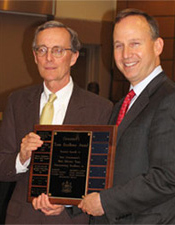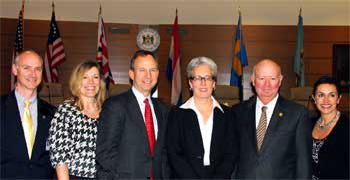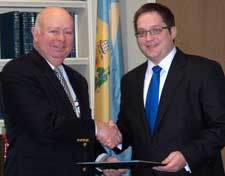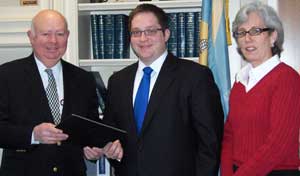Mental Health Court
Mental Health Court News
News Journal Recognizes Mental Health Court & Its Impact on Recidivism

Superior Court's Mental Health Court was recognized for its success in a recent News Journal article by Beth Miller, "Mental Health Court Targets Recidivism: Hugs, Thanks and Applause – Where Justice is United for Extra Chance." The article explains that the special court under the oversight of Judge Jan R. Jurden was established in 2008 to help motivated defendants get help for their mental illnesses and avoid repeat encounters with the criminal justice system. With the agreement of prosecutors, some participants are in on probation, some are in as a diversion from the regular court system.
"There are plenty who don't make it. Almost half must leave the program for one reason or another. The success stories, though, unfold in the courtroom as [Judge] Jurden asks for information from representatives of the public defender's office, the Attorney General's Office, probation officers, treatment coordinators and social workers, all of whom attend the hearings."
The program is capped at 40 people, but Jurden says if resources were sufficient, the demand would easily triple the number of participants in a few months' time.
Mental Health Court Team Receives Governor's 2010 Excellence Award

Superior Court's New Castle County Mental Health Court Team is the 2010 recipient of the Governor's Team Excellence Award. This annual award recognizes teamwork to produce superior customer service and tangible results.
Mental Health Court's team consists of employees from the Department of Health and Social Services', Treatment Access Center (TASC), Department of Correction, Office of Probation and Parole, Office of the Public Defender, Department of Justice, University of Delaware and Superior Court.
Awards were presented to Superior Court's Hon. Jan R. Jurden, Hon. Mark S. Vavala, Carmen J. Facciolo, III, Marjorie L. Swain, Angela White, Susan Hearn, Shannon Larner, and Robert G. Hastings; Delaware Health & Social Service/TASC's Susan K. McLaughlin, Stefanie Garbatowski and Tom Beardsley; DOC/Probation & Parole's Daina Gunther, Laurie Pezick, Georgiana Staley, and Emily Robinson, Public Defender's Office Brian Bartley, Esq., Department of Justice's Joseph Grubb and Esq., James Kriner, Esq.; and the University of Delaware's Dr. Chrysanthi Leon.

The team developed the first felony mental health court in Delaware using an innovative and comprehensive approach toward treatment and supervision of mentally ill probationers.
Through this team's efforts, Delaware saved almost $90,000 and identified new treatment, case management and mental health services for participants in the program.
"This team has shown exemplary efforts in finding efficiencies and extending better services to Delawareans in need," said Governor Markell. "The team found ways to save money and provide self sufficiency for a special population of people that needed help."
Superior Court Recognizes Attorney With Official Commendation for Pro Bono Advocacy

On February 3, 2010, Superior Court President Judge James T. Vaughn Jr. presented Joshua J. Novak, Esq., of Richards, Layton & Finger, with an Official Commendation from the Superior Court of Delaware for his pro bono advocacy work in our Mental Health Court. Judge Jan R. Jurden, who oversees the Mental Health Court, also attended the ceremony in Chambers.
Since our Mental Health Court launch in April 2008, the collaborative effort to identify, support and guide individuals with serious mental issues to recovery and self sufficiency as an alternative to repeated incarceration for violations of probation or commission of new offense has had the outstanding support of many dedicated individuals from Superior Court and our team of institutional partners; the Department of Justice, the Office of the Public Defender, the Office of Probation and Parole, the Department of Correction, the Treatment Access Center (TASC), and the Division of Vocational Rehabilitation.
In addition to the fine work of these institutional partners, the program's success has been bolstered by the commitment of pro bono attorneys who act as advocates for our Mental Health Court participants. Joshua J. Novak, Esq. is one of these advocates. He has been officially recognized by the Court for his public service advocacy efforts that went above and beyond program expectations.

He became involved in the program in June 2009 when Judge Jurden approached William J. Wade, Esq., Director, Richards, Layton & Finger, about the need for pro bono advocates for the Mental Health Court defendants. Josh, a firm Associate who practices Limited Liability Company and Partnership Advisory Group, agreed to become a Mental Health Court defendant's advocate.
Since then, Josh has volunteered over 110 hours of his time, and has assisted the defendant in recovering property taken from his home, petitioning the Court of Chancery for new clothing for the defendant, and overseeing the sale of the defendant's mother's house. Josh visited the defendant multiple times while the defendant was incarcerated, arranged for the defendant to visit his mother in a nursing home, and contacted the defendant weekly to make sure he was getting the treatment and medication he needed and to update him on his legal situation. Josh encouraged and supported the defendant throughout his probation, making sure the defendant knew he had to "step up and help" himself.
Josh strongly acknowledges that none of this would have been possible without Richards, Layton & Finger support. "I couldn't have done this work without the firm's support unwavering support and commitment to pro bono activities."
When asked why this non-litigator became so committed to the Mental Health Court program, Joshua related that "it opened my eyes to a lot of things. This was my first experience with mental health and substance abuse issues. Of course, I knew that people suffered from these diseases, but I was naïve. This experience has humanized and personalized these issues that so many are battling. Here was a good individual who had fallen on hard times. Simply having someone advocate for him has helped to empower him to turn his life around."
December 29, 2009—Mental Health Court Team Nominated for Governor's Award
The Governor's Team Excellence Awards encourage teamwork by recognizing groups of state employees who use continuous quality improvement tools and excel in leadership, team dynamics and communication to produce superior customer service and tangible results. This year, 12 teams, representing the efforts of 170 state employees, were nominated for the award.
Our Mental Health Court team includes Superior Court staff and personnel from the Department of Justice, the Office of the Public Defender, the Office of Probation and Parole, the Department of Correction, the Treatment Access Center (TASC), and the Division of Vocational Rehabilitation.
July 15-17, 2009-National Mental Health Court Training Event
Judge Jan R. Jurden attended the Bureau of Justice Assistance (BJA) / The Council of State Governments Justice Center's National Technical Assistance and Training Event, Smart Responses in Tough Times: Achieving Better Outcomes for People with Mental Illnesses Involved in the Criminal Justice System in Washington D.C. on a BJA scholarship. Attendees came from all over the country, representing courts, corrections, community treatment organizations, police, legislatures, and charitable foundations.
Presentations included sessions on Veterans courts, data collection to assess mental health courts cost effectiveness and effectiveness in reducing recidivism, improving public safety, and saving money through reduced jail/prison time, information sharing, collaboration between agencies, i.e., courts, police, corrections, integrating employment strategies into criminal justice programs, pretrial diversion opportunities, prioritizing populations with co-occurring disorders, and addressing homeless populations, among others.
Training Event materials have been published on The Council of State Governments Justice Center's Website.
